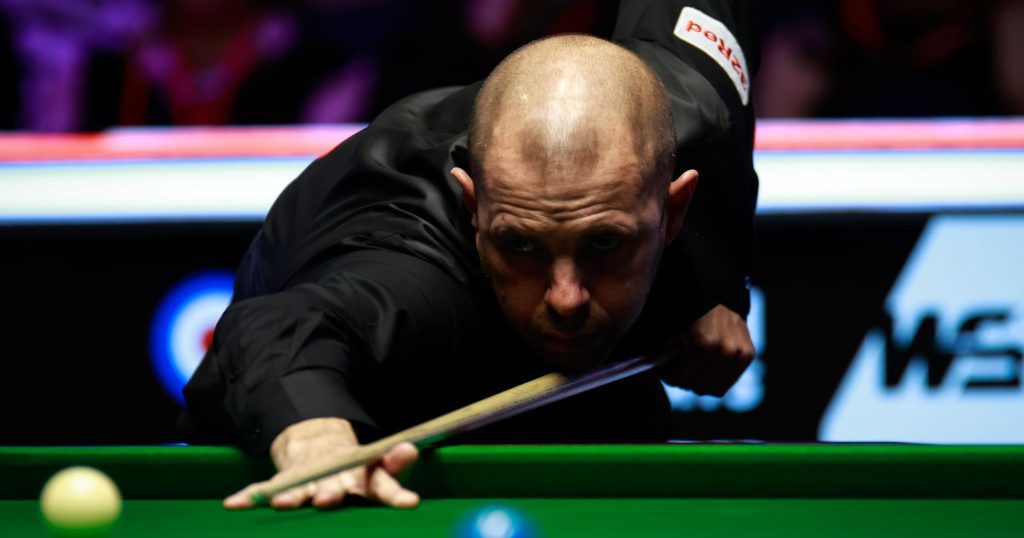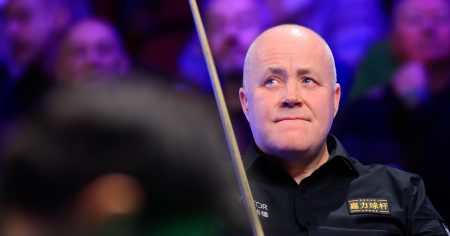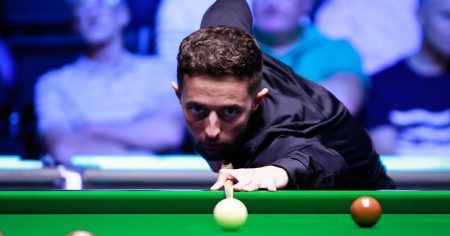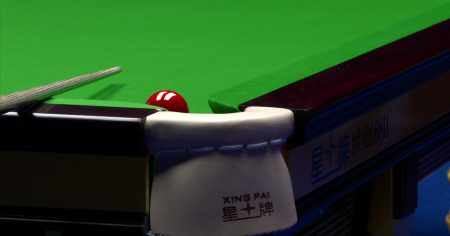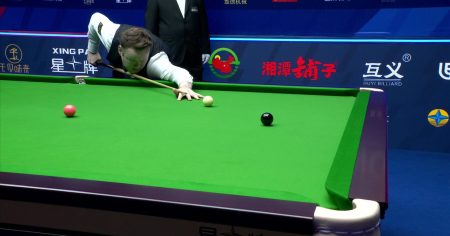The German Masters snooker semi-final clash between Barry Hawkins and Yuan Sijun witnessed a moment of sheer luck that swung the momentum dramatically. Hawkins, facing a challenging shot with the cue ball tight on the cushion, attempted a delicate escape that went horribly awry. Instead of nudging the desired red ball, his cue tip glanced off, sending the white careening across the table, seemingly destined for a foul. However, in a stroke of unbelievable fortune, the cue ball struck another red, potting it and leaving Hawkins perfectly positioned for the next shot. The unexpected turn of events left Hawkins visibly stunned, while Yuan could only watch in disbelief as his opponent capitalized on the fluky pot. This moment became the defining image of the match, highlighting the unpredictable nature of snooker and the role of luck in determining its outcomes.
The seemingly impossible fluke completely transformed the frame’s dynamic. Before the shot, Hawkins was facing a difficult situation, trapped against the cushion with limited options. He risked a foul, potentially handing Yuan an advantage. However, the unexpected pot not only averted disaster but also handed him an unlikely opportunity. The red not only went in, but the cue ball also settled in a prime position for a continuation shot, allowing Hawkins to build a substantial break and seize control of the frame. This unexpected swing in momentum underlined the capricious nature of snooker, where a single moment of luck can completely alter the course of a match. Yuan, who had seemingly been in control, was left reeling from the unexpected turn of events.
The fluke’s impact extended beyond the immediate frame. The psychological blow to Yuan was palpable. He had been playing confidently and appeared to be on the verge of extending his lead. However, witnessing such a fortunate turn of events for his opponent visibly unsettled him. The unexpected nature of the pot seemed to disturb his rhythm and concentration, affecting his subsequent play. Hawkins, on the other hand, gained not only points on the scoreboard but also a significant psychological boost. The lucky escape relieved the pressure he had been under and provided him with renewed confidence, allowing him to capitalize on the opportunity presented by the fluke and dominate the remainder of the frame.
The incident sparked extensive debate among commentators and fans. Some argued that such moments of luck are an integral part of snooker, adding to the drama and excitement of the game. They pointed out that a player’s ability to capitalize on good fortune, just as Hawkins did, is also a skill. Others, however, felt that such extreme strokes of luck detract from the skill-based aspect of the sport. They argued that the outcome of a frame, or even a match, can be unfairly influenced by events beyond a player’s control, diminishing the importance of strategy, precision, and tactical acumen. The debate highlighted the complex relationship between luck and skill in snooker, with no easy answers.
The “fluke” also raised questions about the definition of skill in snooker. While potting the red was entirely accidental, Hawkins’ subsequent play demonstrated his ability to exploit the opportunity presented by the fluke. He displayed composure, potting skills, and tactical awareness to build a substantial break after the lucky pot. This raised questions about whether capitalizing on luck can be considered a skill in itself. Some argued that it requires mental fortitude, strategic thinking, and the ability to adjust quickly to changing circumstances, all qualities that are considered essential skills in snooker. Thus, while the pot itself was pure luck, Hawkins’ response demonstrated his snooker prowess.
In conclusion, the seemingly impossible fluke Hawkins benefited from in the German Masters semi-final against Yuan Sijun became the defining moment of the match. It highlighted the significant role luck plays in snooker, its potential to dramatically swing momentum, and its ability to influence the psychological state of the players. The incident also generated discussions about the definition of skill in the sport, with some arguing that capitalizing on luck, as Hawkins did, requires a specific set of skills. While the fluke ultimately favored Hawkins, it underscored snooker’s unpredictable nature and its ability to produce dramatic and memorable moments, adding another layer to the complex and fascinating world of professional snooker.




